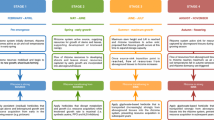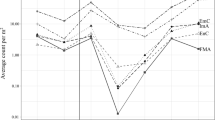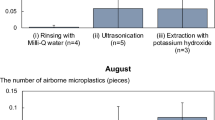Abstract
Spotted-wing drosophila, Drosophila suzukii (Matsumura) (Diptera: Drosophilidae), is one of the most detrimental pests of small fruit crops worldwide and its control relies heavily on pesticides, so there is a need to develop alternative management practices. Cultural practices that make the microclimate hotter, drier, and brighter than optimal conditions for the pest may be highly effective. In this two-year study, we evaluated how black, white, and metallic plastic mulches influence the raspberry plants’ microclimate to reduce D. suzukii larval infestation of fruit in the canopy and increase mortality of fallen larvae and pupae on the ground. All three plastic mulches reduced D. suzukii larval infestation of fruit by 40–72% and killed 80–100% of larvae and pupae placed on the mulch surface. The mechanisms at play are likely the compounded effects of increased ultraviolet (UV) light, hotter and drier conditions in the low canopy, and hot mulch surface temperature. UV light may be especially important since it reduced D. suzukii oviposition in the lab. Overall, plastic mulches can effectively modify the microclimate to make it less favorable for D. suzukii, reducing infestation in fruit and on the ground.








Similar content being viewed by others
References
Andreotti C, Ravaglia D, Costa G (2010) Effects of fruit load and reflective mulch on phenolic compounds accumulation in nectarine fruit. Eur J Hortic Sci 75:53–59
Ballman E, Drummond F (2019) Larval movement of spotted wing drosophila, Drosophila suzukii (Matsumura) (Diptera: Drosophilidae). J Kansas Entomol Soc 92:412. https://doi.org/10.2317/0022-8567-92.1.412
Ballman ES, Collins JA, Drummond FA (2017) Pupation behavior and predation on Drosophila suzukii (Diptera: Drosophilidae) pupae in maine wild blueberry fields. J Econ Entomol 110:2308–2317. https://doi.org/10.1093/jee/tox233
Bolda MP, Goodhue RE, Zalom FG (2010) Spotted wing drosophila: potential economic impact of a newly established pest. Giannini Found Agric Econ Univ Calif 5–8
Cini A, Ioriatti C, Anfora G (2012) A review of the invasion of Drosophila suzukii in Europe and a draft research agenda for integrated pest management. Bull Insectol 65:149–160
Cronin TW, Bok MJ (2016) Photoreception and vision in the ultraviolet. J Exp Biol 219:2790–2801
Croxton SD, Stansly PA (2014) Metalized polyethylene mulch to repel Asian citrus psyllid, slow spread of huanglongbing and improve growth of new citrus plantings. Pest Manag Sci 70:318–323. https://doi.org/10.1002/ps.3566
Decoteau DR, Kasperbauer MJ, Hunt PG (1989) Mulch surface color affects yield of fresh-market tomatoes. J Am Soc Hortic Sci 114(2):216–219
Diepenbrock LM, Burrack HJ (2017) Variation of within-crop microhabitat use by Drosophila suzukii (Diptera: Drosophilidae) in blackberry. J Appl Entomol 141:1–7. https://doi.org/10.1111/jen.12335
DiGiacomo G, Hadrich J, Hutchison WD et al (2019) Economic impact of spotted wing drosophila (Diptera: Drosophilidae) yield loss on minnesota raspberry farms: a grower survey. J Integr Pest Manag 10:11. https://doi.org/10.1093/jipm/pmz006
Evans RK, Toews MD, Sial AA (2017) Diel periodicity of Drosophila suzukii (Diptera: Drosophilidae) under field conditions. PLoS One 12:0171718. https://doi.org/10.1371/journal.pone.0171718
Evans RK, Toews MD, Sial AA (2018) Impact of heat stress on development and fertility of Drosophila suzukii Matsumura (Diptera: Drosophilidae). J Therm Biol 78:92–99. https://doi.org/10.1016/j.jinsphys.2019.02.008
Farnsworth D, Hamby KA, Bolda M et al (2017) Economic analysis of revenue losses and control costs associated with the spotted wing drosophila, Drosophila suzukii (Matsumura), in the California raspberry industry. Pest Manag Sci 73:1083–1090. https://doi.org/10.1002/ps.4497
Flocks J (2012) The environmental and social injustice of farmworker pesticide exposure. Geo J Poverty L Pol’y 19:255
Fountain MT, Badiee A, Hemer S et al (2020) The use of light spectrum blocking films to reduce populations of Drosophila suzukii Matsumura in fruit crops. Sci Rep 10:15358. https://doi.org/10.1038/s41598-020-72074-8
Gordon GG, Foshee WG, Reed ST et al (2008) Plastic mulches and row covers on growth and production of summer squash. Int J Veg Sci 14:322–338. https://doi.org/10.1080/19315260802215830
Gress BE, Zalom FG (2019) Identification and risk assessment of spinosad resistance in a California population of Drosophila suzukii. Pest Manag Sci 75:1270–1276. https://doi.org/10.1002/ps.5240
Guédot C, Avanesyan A, Hietala-Henschell K (2018) Effect of temperature and humidity on the seasonal phenology of Drosophila suzukii (diptera: Drosophilidae) in Wisconsin. Environ Entomol 47:1365–1375. https://doi.org/10.1093/ee/nvy159
Ham JM, Kluitenberg GJ, Lamont WJ (1993) Optical properties of plastic mulches affect the field temperature regime. J Am Soc Hortic Sci 118:188–193. https://doi.org/10.21273/jashs.118.2.188
Hamby KA, E Bellamy D, Chiu JC, Lee JC, Walton VM, Wiman NG, York RM, Biondi A (2016) Biotic and abiotic factors impacting development, behavior, phenology, and reproductive biology of Drosophila suzukii. J Pest Sci 89:605–619
Hardie RC (1979) Electrophysiological analysis of fly retina. I: Comparative properties of R1–6 and R 7 and 8. J Comp Physiol A 129:19–33. https://doi.org/10.1007/BF00679908
Haye T, Girod P, Cuthbertson AGS et al (2016) Current SWD IPM tactics and their practical implementation in fruit crops across different regions around the world. J Pest Sci 89:643–651. https://doi.org/10.1007/s10340-016-0737-8
Jaffe BD, Guédot C (2019) Vertical and temporal distribution of spotted-wing drosophila (Drosophila suzukii) and pollinators within cultivated raspberries. Pest Manag Sci. https://doi.org/10.1002/ps.5343
Jakopic J, Veberic R, Stampar F (2007) The effect of reflective foil and hail nets on the lighting, color and anthocyanins of “Fuji” apple. Sci Hortic 115:40–46. https://doi.org/10.1016/j.scienta.2007.07.014
Kamiyama MT, Schreiner Z, Guédot C (2019) Diversity and abundance of natural enemies of Drosophila suzukii in Wisconsin, USA fruit farms. Biocontrol 64:665–676. https://doi.org/10.1007/s10526-019-09966-w
Kasirajan S, Ngouajio M (2012) Polyethylene and biodegradable mulches for agricultural applications: a review. Agron Sustain Dev 32:501–529. https://doi.org/10.1007/s13593-011-0068-3
Kelber A, Henze MJ (2013) Colour vision: parallel pathways intersect in drosophila. Curr. Biol. 23:1043–1045
Kinjo H, Kunimi Y, Nakai M (2014) Effects of temperature on the reproduction and development of Drosophila suzukii (Diptera: Drosophilidae). Appl Entomol Zool 49:297–304. https://doi.org/10.1007/s13355-014-0249-z
Lamont WJ (1993) Plastic mulches for the production of vegetable crops. HorTechno 3:35–39. https://doi.org/10.1016/B978-0-08-102170-5.00003-8
Leach H, Moses J, Hanson E et al (2018) Rapid harvest schedules and fruit removal as non-chemical approaches for managing spotted wing Drosophila. J Pest Sci 91:219–226. https://doi.org/10.1007/s10340-017-0873-9
Lee JC, Shearer PW, Barrantes LD et al (2013) Trap designs for monitoring Drosophila suzukii (Diptera: Drosophilidae). Environ Entomol 42:1348–1355. https://doi.org/10.1603/en13148
Little CM, Chapman TW, Hillier NK (2018) Effect of color and contrast of highbush blueberries to host-finding behavior by Drosophila suzukii (Diptera: Drosophilidae). Environ Entomol 47:1242–1251. https://doi.org/10.1093/ee/nvy102
Little CM, Rizzato AR, Charbonneau L et al (2019) Color preference of the spotted wing Drosophila, Drosophila suzukii. Sci Rep 9:16051. https://doi.org/10.1038/s41598-019-52425-w
McCauley LA, Anger WK, Keifer M et al (2006) Studying health outcomes in farmworker populations exposed to pesticides. Environ Health Perspect 114:953–960. https://doi.org/10.1289/ehp.8526
McIntosh H, Atucha A, Townsend PA et al (2021) Plastic mulches reduce adult and larval populations of Drosophila suzukii in fall-bearing raspberry. J Pest Sci 95:525–536. https://doi.org/10.1007/s10340-021-01456-2
McIntosh H, Guédot C, Atucha A (2023) Plastic mulches improve yield and reduce spotted-wing drosophila in primocane raspberry. Sci Hortic 320:112203. https://doi.org/10.1016/j.scienta.2023.112203
Nottingham LB, Beers EH (2020) Management of pear psylla (Hemiptera: Psyllidae) using reflective plastic mulch. J Econ Entomol 113:2840–2849. https://doi.org/10.1093/jee/toaa241
Nottingham LB, Kuhar TP (2016) Reflective polyethylene mulch reduces Mexican bean beetle (Coleoptera: Coccinellidae) densities and damage in snap beans. J Econ Entomol 109:1785–1792. https://doi.org/10.1093/jee/tow144
Rendon D, Walton VM (2019) Drip and overhead sprinkler irrigation in blueberry as cultural control for Drosophila suzukii (Diptera: Drosophilidae) in Northwestern United States. J Econ Entomol 112:745–752. https://doi.org/10.1093/jee/toy395
Rendon D, Hamby KA, Arsenault-Benoit AL et al (2019) Mulching as a cultural control strategy for Drosophila suzukii in blueberry. Pest Manag Sci. https://doi.org/10.1002/ps.5512
Rhainds M, Kovach J, Dosa EL, English-Loeb G (2001) Impact of reflective mulch on yield of strawberry plants and incidence of damage by tarnished plant bug (Heteroptera: Miridae). J Econ Entomol 94:1477–1484. https://doi.org/10.1603/0022-0493-94.6.1477
Rice KB, Short BD, Jones SK, Leskey TC (2016) Behavioral responses of Drosophila suzukii (Diptera: Drosophilidae) to visual stimuli under laboratory, semifield, and field conditions. Environ Entomol 45:1480–1488. https://doi.org/10.1093/ee/nvw123
Rossi Stacconi V (2022) Drosophila suzukii (spotted wing drosophila). CABI Compend. https://doi.org/10.1079/cabicompendium.109283
Roubos CR, Rodriguez-Saona C, Holdcraft R et al (2014) Relative toxicity and residual activity of insecticides used in blueberry pest management: mortality of natural enemies. J Econ Entomol 107:277–285. https://doi.org/10.1603/EC13191
Ryan GD, Emiljanowicz L, Wilkinson F et al (2016) Thermal tolerances of the spotted-wing drosophila drosophila suzukii (Diptera: Drosophilidae). J Econ Entomol 109:746–752. https://doi.org/10.1093/jee/tow006
Sarkar N, Rhodes EM, Spies J et al (2020) Evaluation of non-target effects of OMRI-listed insecticides for management of Drosophila suzukii Matsumura in berry crops. J Appl Entomol 144:12–25. https://doi.org/10.1111/jen.12713
Schnaitmann C, Garbers C, Wachtler T, Tanimoto H (2013) Color discrimination with broadband photoreceptors. Curr Biol 23:2375–2382. https://doi.org/10.1016/j.cub.2013.10.037
Schöneberg T, Arsenault-Benoit A, Taylor CM et al (2020) Pruning of small fruit crops can affect habitat suitability for Drosophila suzukii. Agric Ecosyst Environ 294:106860. https://doi.org/10.1016/j.agee.2020.106860
Schöneberg T, Lewis MT, Burrack HJ et al (2021) Cultural control of Drosophila suzukii in small fruit—current and pending tactics in the US. Insects 12:1–18
Schwartz NA, Von Glascoe CA, Torres V et al (2015) “Where they (live, work and) spray”: Pesticide exposure, childhood asthma and environmental justice among Mexican–American farmworkers. Heal Place 32:83–92. https://doi.org/10.1016/j.healthplace.2014.12.016
Shaw B, Fountain M, Wijnen H (2019) Control of daily locomotor activity patterns in Drosophila suzukii by the circadian clock, light, temperature and social interactions. J Biol Rhythms 34:463–481. https://doi.org/10.1177/0748730419869085
Sial AA, Roubos CR, Gautam BK et al (2019) Evaluation of organic insecticides for management of spotted-wing drosophila (Drosophila suzukii) in berry crops. J Appl Entomol 143:593–608. https://doi.org/10.1111/jen.12629
Smrke T, Persic M, Veberic R et al (2019) Influence of reflective foil on persimmon (Diospyros kaki Thunb.) fruit peel colour and selected bioactive compounds. Sci Rep 9:1–8. https://doi.org/10.1038/s41598-019-55735-1
Stockton D, Wallingford A, Rendon D et al (2019) Interactions between biotic and abiotic factors affect survival in overwintering Drosophila suzukii (Diptera: Drosophilidae). Environ Entomol 48:454–464. https://doi.org/10.1093/ee/nvy192
Strik BC, Davis AJ, Bryla DR, Orr ST (2020) Individual and combined use of sawdust and weed mat mulch in a new planting of Northern Highbush Blueberry I. Impacts on plant growth and soil and canopy temperature. HortScience 55:1280–1287
Tarara J (2000) Microclimate modification with plastic mulch. HortScience 35:169–180
Tochen S, Dalton DT, Wiman N et al (2014) Temperature-related development and population parameters for Drosophila suzukii (Diptera: Drosophilidae) on cherry and blueberry. Environ Entomol 43:501–510. https://doi.org/10.1603/en13200
Tochen S, Woltz JM, Dalton DT et al (2016) Humidity affects populations of Drosophila suzukii (Diptera: Drosophilidae) in blueberry. J Appl Entomol 140:47–57. https://doi.org/10.1111/jen.12247
Van Timmeren S, Isaacs R (2013) Control of spotted wing drosophila, Drosophila suzukii, by specific insecticides and by conventional and organic crop protection programs. Crop Prot 54:126–133. https://doi.org/10.1016/j.cropro.2013.08.003
Van Timmeren S, Diepenbrock LM, Bertone MA et al (2017a) A filter method for improved monitoring of Drosophila suzukii (Diptera: Drosophilidae) larvae in fruit. J Integr Pest Manag 8:23. https://doi.org/10.1093/jipm/pmx019
Van Timmeren S, Horejsi L, Larson S et al (2017b) Diurnal activity of Drosophila suzukii (diptera: Drosophilidae) in highbush blueberry and behavioral response to irrigation and application of insecticides. Environ Entomol 46:1106–1114. https://doi.org/10.1093/ee/nvx131
Van Timmeren S, Mota-Sanchez D, Wise JC, Isaacs R (2018) Baseline susceptibility of spotted wing Drosophila (Drosophila suzukii) to four key insecticide classes. Pest Manag Sci 74:78–87. https://doi.org/10.1002/ps.4702
Weir PT, Dickinson MH (2012) Flying drosophila orient to sky polarization. Curr Biol 22:21–27. https://doi.org/10.1016/j.cub.2011.11.026
Winkler A, Jung J, Kleinhenz B, Racca P (2020) A review on temperature and humidity effects on Drosophila suzukii population dynamics. Agric for Entomol 22:179–192. https://doi.org/10.1111/afe.12381
Woltz JM, Lee JC (2017) Pupation behavior and larval and pupal biocontrol of Drosophila suzukii in the field. Biol Control 110:62–69. https://doi.org/10.1016/j.biocontrol.2017.04.007
Yamaguchi S, Desplan C, Heisenberg M (2010) Contribution of photoreceptor subtypes to spectral wavelength preference in Drosophila. Proc Natl Acad Sci U S A 107:5634–5639. https://doi.org/10.1073/pnas.0809398107
Zerulla FN, Augel C, Zebitz CPW (2017) Oviposition activity of Drosophila suzukii as mediated by ambient and fruit temperature. PLoS One 12:0187682. https://doi.org/10.1371/journal.pone.0187682
Zhang H, Miles C, Gerdeman B et al (2021) Plastic mulch use in perennial fruit cropping systems—a review. Sci Hortic 281:304–4238
Zhu EY, Guntur AR, He R et al (2014) Egg-laying demand induces aversion of UV light in drosophila females. Curr Biol 24:2797–2804. https://doi.org/10.1016/j.cub.2014.09.076
Acknowledgements
This research was conducted on Ho-Chunk land in Dejope, which has been culturally and agriculturally important for Indigenous people since time immemorial. This land was forcibly ceded to the U.S. government and European settlers in the mid-nineteenth century. Through the Morrill Act of 1862, Land Grant Universities like the University of Wisconsin-Madison were established from the sale of stolen or forcibly ceded Indigenous land. We recognize that these institutions have built enormous wealth from Indigenous land and have contributed to the formation of today’s industrialized agricultural system that favors wealthy, White farmers and corporations while marginalizing farmers who are Indigenous, Black, people of color, queer, and poor. We also recognize that agricultural research at these Land Grant Universities centers Western science while undervaluing Indigenous knowledge and underserving Indigenous and other marginalized people. It is critical that land-based researchers continually evaluate how their research and outreach work benefits from stolen land and how it may perpetuate colonialism. We challenge all people doing research in agricultural systems to evaluate who benefits from their work and who is excluded, and to engage in the process of decolonizing their science by centering marginalized farmers, social justice, and land sovereignty. We are grateful to Niko Schmitt, Jarret Miles-Kroening, and Rachel O’Neill Lewis for their contribution to field and lab work. We thank Philip Townsend, Beckett Hills, and Ben Spaier for assistance with radiance measurements. We are grateful for Steven Van Timmeren and Rufus Isaacs for fly colony help. We appreciate donations of supplies by Nourse Farms, Imaflex, and Organix Solutions.
Funding
This material is based upon work supported by the National Science Foundation Graduate Research Fellowship Program (DGE-1747503). Any opinions, findings, and conclusions or recommendations expressed in this material are those of the authors and do not necessarily reflect the views of the National Science Foundation. This work was also supported by the Wisconsin Department of Agriculture, Trade, and Consumer Protection (18-01), the UW-Madison Office of the Vice Chancellor for Research and Graduate Education and the Wisconsin Alumni Research Foundation, North Central Region Sustainable Agriculture Research and Education Program Graduate Student Grant (H006607430), and the University of Wisconsin-Madison Center for Integrated Agricultural Systems Graduate Student Mini-Grant.
Author information
Authors and Affiliations
Corresponding author
Ethics declarations
Conflict of interest
The authors declare they have no conflicts of interest.
Additional information
Communicated by Kent Daane.
Publisher's Note
Springer Nature remains neutral with regard to jurisdictional claims in published maps and institutional affiliations.
Supplementary Information
Below is the link to the electronic supplementary material.
Supplementary file 1: Video of lab-reared Drosophila suzukii larvae placed on black plastic mulch in the field. Larvae struggle to crawl on the plastic mulch surface due to the temperature and texture, and visibly desiccate quickly (MOV 21870 kb)
Supplementary file 2: Video of field Drosophila suzukii larvae emerged from fallen raspberry on white plastic mulch. Larvae struggles to crawl away from the fruit and seems to desiccate (MOV 89947 kb)
Rights and permissions
Springer Nature or its licensor (e.g. a society or other partner) holds exclusive rights to this article under a publishing agreement with the author(s) or other rightsholder(s); author self-archiving of the accepted manuscript version of this article is solely governed by the terms of such publishing agreement and applicable law.
About this article
Cite this article
McIntosh, H., Smith, M.B., Weissner, M. et al. Modifications of plant microclimate by plastic mulches reduces Drosophila suzukii infestation. J Pest Sci (2024). https://doi.org/10.1007/s10340-023-01715-4
Received:
Revised:
Accepted:
Published:
DOI: https://doi.org/10.1007/s10340-023-01715-4




